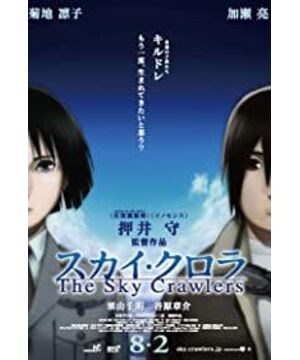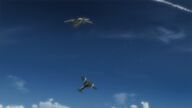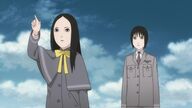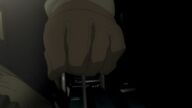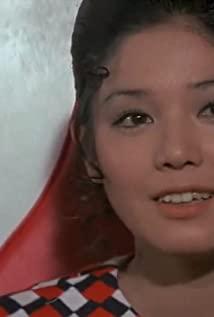Note: Spoilers for the plot!
There are three backbones in the Japanese animation and film industry, Hayao Miyazaki, Toshi Kon and Mamoru Oshii. Among them, Hayao Miyazaki's films are the most famous, and there are many fans in China from all age groups. It can be said that his films are "suitable for all ages", and because his animations are greatly influenced by the West, they are very important in theme and concept. It is easy to be accepted by foreign audiences. However, Japan also has many anime feature films with a strong Japanese style, such as the most famous film "Millennium Actress" by the recently deceased director Toshi Kon and "Aerial Killer" adapted from a Japanese novel by Mamoru Oshii. Jin Min's style is rather dark, and the conception of the story and the way of telling it are too peculiar, which is not acceptable to me. His "Red Hot Chili Peppers" has quite a few scary and uncomfortable scenes. Oshii Mori's most famous work should be the Japanese animation "Ghost in the Shell", which is still a classic in the hearts of many fans. "Air Killer" is an anime released in 2008. I noticed it in a magazine, but I didn't have much interest in it after watching the film's spoilers, because I felt that its plot was too dark, and Some changes in concept. But this summer, after watching Jin Min's film, I suddenly thought of Oshii Mamoru's "air killer", so I watched this film with the idea of watching the masterpieces of the three major Japanese animation film directors.
"Aerial Killer" is a very long film, a two-hour animation, with a very gorgeous title, which staged a fierce aerial battle in a clear blue sky with white clouds floating. The superb CG technology makes the scene look unusual Reality and grandeur, coupled with the ethereal and sad theme song, is indeed a very impressive opening. The painting style of the characters in the film is very special, not my type, so I am a little disappointed. There is very little dialogue between the characters, the camera moves slowly, and the scene is three-point-one-line. In short, there is not much change in space except for the gorgeous aerial combat shots. The most prominent feature of the film should be the "calmness" that permeates every shot, always repressed in silence, with a touch of Nordic cinema. The director tries to create a sense of "meaningless" and "Hopeless" in the film, and the seemingly non-existent love between the protagonist and the female chief is also difficult to capture. This is definitely not a film that gives hope, but it is very in line with Japanese values, "life and death", "reincarnation of life" are fully reflected in this film. The film had a lot of suspense at the beginning, and always focused on the shooting of details. For example, what impresses me the most now is the shot of one of the characters stacking newspapers. He carefully folded the newspapers into a neat piece , a square without any folds. I get chills thinking about this shot because there are so many clues in this one shot. The climax of the film is in the last part, all the repressed emotions and the hidden truth are revealed in a short period of time, but it brings a heavier despair.
Hannan Yuichi is a new fighter pilot who reports to the base. He is a created child of God, a human who can never grow up. Grass Pheasant Suisu is the female commander of the base, and she is stern. The life at the base is ordinary and monotonous, with daily routine attendance and few dialogues when meeting with teammates, that is Hannan Yuichi's daily life. However, the roommate's sudden reticence and mysterious attitude when talking about his former roommate, and various rumors about the pheasant water element, make the film slowly shrouded in a cloud of suspicion. The details revealed inadvertently, the attitude of people who are hesitant to say anything, and the feeling that Nanyou's pair of pheasant water elements are familiar, make the audience feel that the undercurrent is turbulent under the flat plot. As the mystery of the pheasant water element gradually faded, the relationship with Hannan Yuichi gradually warmed up, and the plot was slowly pushed to a climax. But the arrival of the climax made people feel more and more heavy. "How about killing me? Otherwise, we will never be able to get out." This sentence from the grass pheasant is a watershed in the film. After that, the plot suddenly becomes intense and compact, and the heavy fate that Hannan and the grass pheasant bear. And the cycle of life and death is also revealed. "You have to survive, before you seek any change." The fate of the Son of God is that after being shot down repeatedly, he will come back in another identity, that is, never die, but at the same time it is also doomed that the grass pheasant will have a negative relationship with Hannan or this soul. Love can never be eternal, and the cycle of life and death, love and death is constantly repeated in this base. So much so that the first sentence that the pheasant said when facing the next "Hannan Yuichi" was: "I am the pheasant, I have been waiting for you for a long time.
" It's classified as an "inspirational film", which I totally disagree with. Now after watching it, I remember that there is only a chill and a heavy feeling. The film does not give the audience hope to get rid of reincarnation. The only thing that the grass pheasant can do is to preserve that small hope and to make every return of "Hannan". Consider it a new tomorrow. Pheasant should be the most painful character in the film. She can see fate but can never change it, so she will say something like "What about killing me? Otherwise, we will never be able to escape." Such a desperate sentence .
View more about The Sky Crawlers reviews


